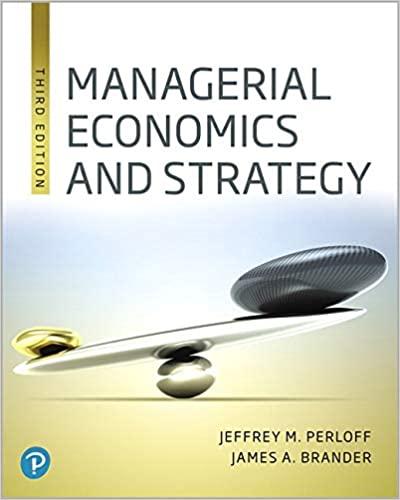Question
1. One of the benefits of economic integration is: Select one: a. Prices increase. b. International Trade increases. c. Firms are forced to merge. d.
1. One of the benefits of economic integration is:
Select one:
a. Prices increase.
b. International Trade increases.
c. Firms are forced to merge.
d. Monopolies become stronger.
e. All of the above.
2. A current account deficit...
Select one:
a.... is always a problem.
b.... can be associated to a Government Budget Deficit.
c.... is due to high national savings.
d.... is never present in developing countries.
e.None of the above.
3. Which of the following statements is true?
Select one:
a. A Free Trade Area implies that countries adopt the same currency.
b. A Free Trade Area implies that countries adopt a common external tariff.
c. A Free Trade Area implies that countries form a single market.
d. A Free Trade Area implies free mobility of labor and capital among the member countries.
e. None of the above.
4. Import quotas are:
Select one:
a. limitations on the maximum amount of a good that can be imported.
b.the same as import tariffs.
c.subsidies to imports.
d.limitations on the maximum amount of a good that can be exported.
e.always present in free trade areas.
5. Which of the following statements is true?
Select one:
a. A Customs Union implies that countries adopt the same currency.
b. A Customs Union implies that countries adopt a common external tariff.
c. A Customs Union implies that countries form a single market.
d. A Customs Union implies free mobility of labor and capital among the member countries.
e. None of the above.
6. One of the benefits of economic integration is:
a.Prices increase.
b.International Trade increases.
c.Firms are forced to merge.
d.Monopolies become stronger.
e.All of the above.
7. What is a true statement concerning the imposition in the U.S. of a tariff on cheese?
a.It lowers the price of cheese domestically.
b.It raises revenue for the government.
c.It raises the price of cheese internationally.
d.It will always result in retaliation from abroad.
e.It leads to higher domestic demand for cheese.
8. Which of the following is a true statement regarding tariffs?
a.They are always beneficial for the country that imposes them.
b.They are beneficial for the consumers and the government.
c.They are beneficial for the country that imposes them if it is a large country.
d.They are never beneficial for the country that imposes them.
e.They are beneficial for the country that imposes them if it is a small country.
9. Import quotas are:
a.always present in free trade areas.
b.the same as import tariffs.
c.limitations on the maximum amount of a good that can be exported.
d.limitations on the maximum amount of a good that can be imported.
e.subsidies to imports.
10. Specific tariffs are:
a.import taxes calculated as a fraction of the value of the imported goods.
b.import taxes stated in specific legal statutes.
c.import taxes calculated based solely on the origin country.
d.import taxes calculated as a fixed charge for each unit of imported goods.
e.the same as import quotas.
Step by Step Solution
There are 3 Steps involved in it
Step: 1

Get Instant Access to Expert-Tailored Solutions
See step-by-step solutions with expert insights and AI powered tools for academic success
Step: 2

Step: 3

Ace Your Homework with AI
Get the answers you need in no time with our AI-driven, step-by-step assistance
Get Started


